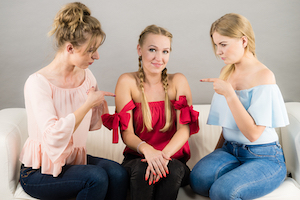 A new study published in the Journal of Personality and Social Psychology looked at whether friendship jealously can be a tool for maintaining friendships in the face of third party threats.
A new study published in the Journal of Personality and Social Psychology looked at whether friendship jealously can be a tool for maintaining friendships in the face of third party threats.
“Friendships are massively important for health and happiness, and they can be threatened when our friends form new friendships or other relationships,” study author Jaimie Arona Krems told us. “In those situations---when our best friends form new, close bonds with other people---we might feel a stab of friendship jealousy. But whereas most scholars suggest that this emotion is solely negative, we took another view.”
Krems, Ph.D, is an Assistant Professor at the Oklahoma Center for Evolutionary Analysis (OCEAN) in the Department of Psychology at Oklahoma State University. Krems and the research team examined whether jealousy might actually benefit us, specifically by helping us hang onto our friends.
“If friendship jealousy were a functional emotion and tool of friendship maintenance, then it should possess certain features,” Krems told us. “It should be elicited only by certain cues (losing friends to other people but not merely losing friends), it should be calibrated to how valued the friendship is and also to reliable cues that one might lose your friendship to someone else, and it should motivate behavior that could mitigate friend loss (what we term "friend guarding").
The research team went in expecting the results they found, overall, that friendship jealousy would possess certain features, which suggest it is quite well-designed to meet the particular challenge of guarding friends and friendships against loss to other people.
“Much of my work explores women's sociality,” Krems told us. “Because that's such an understudied topic, I often find that examining aspects of women's cooperation and competition ends up revealing overlooked information about both sexes. Here, because much of the literature on competition focuses on what men compete over, I wanted to look at resources over which women might compete even more than men: friends. Some say girls' and women's competition over friends is the fiercest competition they've ever seen.”
Another reason Krems took interest in this study topic is that the current state of both research and public opinion was “peeving and wrong” she said.
“There's nothing wrong with people who feel a stab of jealousy when their best friends make new close friends. They're not abnormally developing,” Krems told us. “They don't have malformed ideas of what friendship is. If this emotion were so and solely maladaptive, it probably wouldn't be so prevalent among both children and adults across cultures. It is.”
We even see behavioral evidence consistent with feelings of friendship jealousy in non-human animals, like chimpanzees, cows, and horses. Female mustangs bite and kick other females who try to horn in on their best friends.
Over ten studies were conducted including experiments that elicited friendship jealousy in real-time and studies that asked about people's recalled real-world behavior. This series of studies confirmed the researcher’s predictions about the features of friendship jealousy and also ruled out some possible alternative accounts (e.g., other emotions that we often feel alongside jealousy--sadness and anger--were not causing friend guarding, people weren't just responding about how they think they'd feel if this happened to them).
The study found that friendship jealousy is evoked when our friends form new bonds (but not simply when our friendships wane), feelings of friendship jealousy are attuned to both the value of the friendship in question and whether the friend's new relationship partner stands to take our place, and these feelings seem to motivate "friend-guarding", such as being vigilant about with whom our friends are spending time.
“That worry about whether the new friend will take your place is the reliable cue we expected friendship jealousy to be calibrated to,” Krems told us. “For example, people seem attuned to whether the interloper stands fulfill the same versus some distinct functions for their friends.”
What Krems means by the former is that for example you and your best friend's romantic partner likely fulfill some distinct functions for your best friend, so new romantic partners likely pose lower levels of “replacement threat” and elicit lower levels of friendship jealousy than might your best friend's new close friend.
“We currently have work under review on sex/gender differences in feelings of friendship jealousy, which return us a bit to where the idea originated: that women might compete for best friends more fiercely than men do, even as men and women equally value friends and friendship,” Krems told us. “We're about to finish some other work that also challenges existing ideas that there's simply something wrong with people who feel friendship jealousy (e.g., that they have low self-esteem).”
Patricia Tomasi is a mom, maternal mental health advocate, journalist, and speaker. She writes regularly for the Huffington Post Canada, focusing primarily on maternal mental health after suffering from severe postpartum anxiety twice. You can find her Huffington Post biography here. Patricia is also a Patient Expert Advisor for the North American-based, Maternal Mental Health Research Collective and is the founder of the online peer support group - Facebook Postpartum Depression & Anxiety Support Group - with over 1500 members worldwide. Blog: www.patriciatomasiblog.wordpress.com
Email: tomasi.patricia@gmail.com